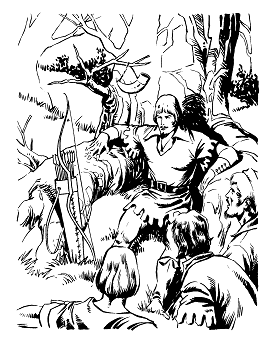Related Research Articles

Robin Hood is a legendary heroic outlaw originally depicted in English folklore and subsequently featured in literature and film. According to legend, he was a highly skilled archer and swordsman. In some versions of the legend, he is depicted as being of noble birth, and in modern retellings he is sometimes depicted as having fought in the Crusades before returning to England to find his lands taken by the Sheriff. In the oldest known versions, he is instead a member of the yeoman class. Traditionally depicted dressed in Lincoln green, he is said to have robbed from the rich and given to the poor.

Sir Guy of Gisbourne is a character from the Robin Hood legends of English folklore. He first appears in "Robin Hood and Guy of Gisborne", where he is an assassin who attempts to kill Robin Hood but is killed by him. In later depictions, he has become a romantic rival to Robin Hood for Maid Marian's love.

The Story of Robin Hood is a 1952 action-adventure film produced by RKO-Walt Disney British Productions, based on the Robin Hood legend, made in Technicolor and filmed in Buckinghamshire, England. It was written by Lawrence Edward Watkin and directed by Ken Annakin. It is the second of Disney's complete live-action films, after Treasure Island (1950), and the first of four films Annakin directed for Disney.

Robin Hood is a 1922 silent adventure film starring Douglas Fairbanks and Wallace Beery. It was the first motion picture ever to have a Hollywood premiere, held at Grauman's Egyptian Theatre on October 18, 1922. The movie's full title, under which it was copyrighted, is Douglas Fairbanks in Robin Hood. It was one of the most expensive films of the 1920s, with a budget estimated at about one million dollars. The film was a smash hit and generally received favorable reviews.

Conquests of the Longbow: The Legend of Robin Hood is a graphic adventure game designed by Christy Marx and published by Sierra On-Line in 1991. It is the second and final part of the Conquests series, which begins with Conquests of Camelot: The Search for the Grail. It features VGA graphics and Sierra's standard icon-driven interface first seen in King's Quest V.
Alan-a-Dale is a figure in the Robin Hood legend. According to the stories, he was a wandering minstrel who became a member of Robin's band of outlaws, the "Merry Men".

Robin Hood is a British television programme, produced by independent production company Tiger Aspect Productions for BBC One, with co-funding from the BBC America cable television channel in the United States. Based on the traditional stories of legendary English folk hero Robin Hood, the programme started on 7 October 2006. Series two commenced broadcasting on 6 October 2007 with the final two episodes on 29 December 2007. Series three began airing on 28 March 2009 for a thirteen-episode run. The series was cancelled by the BBC after series three following the departure of multiple actors, including lead Jonas Armstrong.

Robin Hood is a 1991 British adventure film directed by John Irvin, executive produced by John McTiernan, and starring Patrick Bergin, Uma Thurman, Jürgen Prochnow, Jeroen Krabbé, and Edward Fox. Although originally intended for a theatrical release in the United States and South America, the film instead premiered on television, on the Fox network in those territories a month before the release of Robin Hood: Prince of Thieves. It was released in cinemas in several countries in Europe and elsewhere, including Australia, New Zealand and Japan.

The folkloric hero Robin Hood has appeared many times, in many different variations, in popular modern works.

The Merry Men are the group of outlaws who follow Robin Hood in English literature and folklore. The group appears in the earliest ballads about Robin Hood and remains popular in modern adaptations.

Robin Hood is a 1912 film made by Eclair Studios. The film's costumes feature enormous versions of the familiar hats of Robin and his merry men, and uses the unusual effect of momentarily superimposing images of different animals over each character to emphasize their good or evil qualities. The film was directed by Étienne Arnaud and Herbert Blaché, and written by Eustace Hale Ball. A restored copy of the 30-minute film exists and was exhibited in 2006 at the Museum of Modern Art in New York City.

The Outlaws of Sherwood is a retelling of the legend of Robin Hood by Robin McKinley. In McKinley's afterword, she says, "The retellings through the centuries have echoed concurrent preoccupations." The story includes both the traditional Robin Hood characters — Little John, Much, Friar Tuck, Marian and Alan-a-dale — and characters of McKinley's own invention. Notably, three of the most important characters are women, all of whom escape marriage to prospective spouses chosen by their fathers.
The Sheriff of Nottingham is the main antagonist in the legend of Robin Hood. He is generally depicted as an unjust tyrant who mistreats the local people of Nottinghamshire, subjecting them to unaffordable taxes. Robin Hood fights against him, stealing from the rich, and the Sheriff, in order to give to the poor; it is this characteristic for which Robin Hood is best known. The Sheriff is considered the archenemy of Robin Hood, as he is the most recurring enemy of the well-known outlaw.

Friar Tuck is one of the Merry Men, the band of heroic outlaws in the folklore of Robin Hood.

A Challenge for Robin Hood is a 1967 British adventure film directed by C. M. Pennington-Richards and starring Barrie Ingham, Peter Blythe and John Arnatt.

Tom and Jerry: Robin Hood and His Merry Mouse is a 2012 American animated direct-to-video action-adventure musical comedy film starring the seven-time Academy Award-winning cat-and-mouse duo Tom and Jerry as well as the historical and heroic outlaw Robin Hood. Produced by Warner Bros. Animation and Turner Entertainment Co., the film was released on DVD and Blu-ray on September 28, 2012.

Robin Hood is a 2018 American action-adventure film directed by Otto Bathurst and written by Ben Chandler and David James Kelly, from a story by Chandler. It is a quasi-contemporary retelling of the Robin Hood legend, and follows his training by John to steal from the Sheriff of Nottingham. The film stars Taron Egerton as Robin, and features Jamie Foxx, Ben Mendelsohn, Eve Hewson, Tim Minchin and Jamie Dornan in supporting roles. Returning home to England to learn the corrupt Sheriff of Nottingham (Mendelsohn) has seized his family estate, aristocrat Robin of Loxley joins forces with Friar Tuck (Minchin) and Little John (Foxx) – a fierce Arabian warrior who wants to put an end to the Crusades. Armed with arrows and dubbed Robin Hood, Loxley leads a band of oppressed rebels in a daring plan to rob the Sheriff of his money and take away his power.

Robin Hood is the fictional protagonist of Walt Disney Animation Studios' 21st animated feature film Robin Hood (1973). Robin Hood is voiced by Shakespearean and Tony Award winning actor Brian Bedford. The film is based on the legends of Robin Hood and Reynard the fox, a 12th-century Alsatian fairy tale character, but uses anthropomorphic animals rather than people; in Robin's case being a red fox. The story follows the adventures of Robin Hood, Little John and the inhabitants of Nottingham as they fight against the excessive taxation of Prince John, and Robin Hood wins the hand of Maid Marian.
References
- Schleifer, Martha Furman (ed.). Three Centuries of American Music, G.K. Hall & Co. 1990, Vol, 5, pp. xxvii and 106–330.
- Kinscella, Hazel Gertrude. Music and Romance, pp. 385–386.